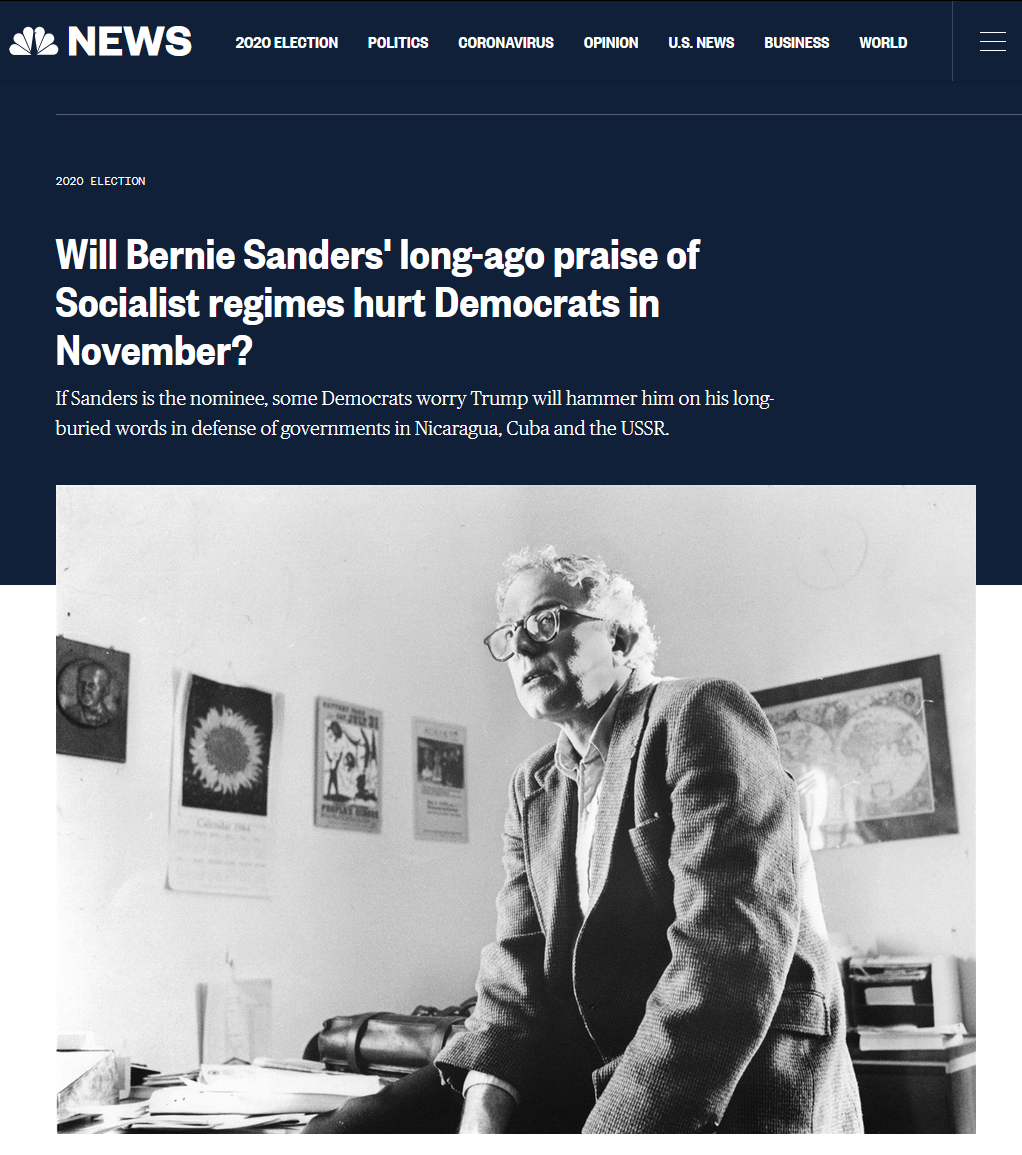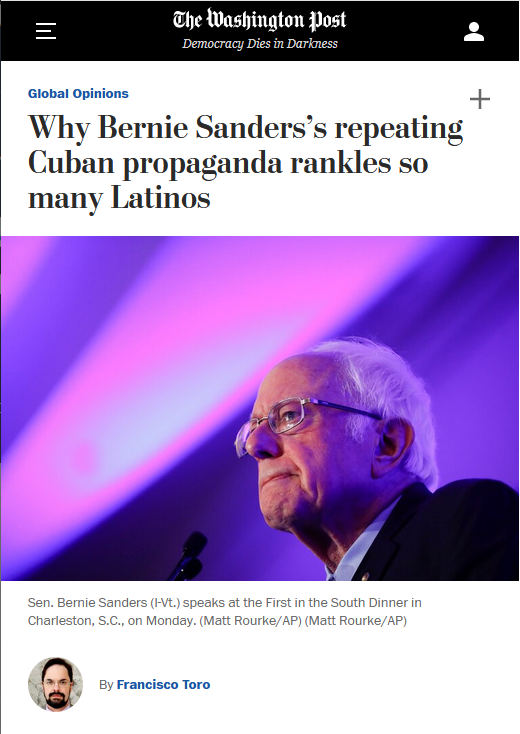Media Malfunction as Sanders Notes Positive Aspects of Latin American Socialism
Gregory Shupak

 When 60 Minutes ( 2/24/20) asked Sen. Bernie Sanders about his past support for aspects of Cuba’s socialist revolution, as well as for Nicaragua’s 1979–90 leftist Sandinista government, Sanders responded by saying he opposes what he described as the “authoritarian” features of the Cuban government, while noting that after the 1959 revolution, Cuba launched “a massive literacy program. Is that a bad thing?”
News organizations seemed unable to process that a major national political figure could say something positive about a socialist country, leaving these outlets flailing around in absurd ways.

NBC (2/21/20) worried that Bernie Sanders' "affinity for revolutionary movements" might mean that the "number of targeted killings of terror suspects would fall if he were president."
During a town hall, CNN’s Chris Cuomo ( 2/24/20) asked Sanders to respond to “the Democrats who say you don't say good things about Fidel Castro, he destroyed freedoms in that country.” The revolution did not “destroy freedoms” in Cuba: The ruler it overthrew, Fulgencio Batista, ran what the US Library of Congress ( 4/01) called a “corrupt and brutal dictatorship,” under whose rule there were 20,000 political killings.
In the New York Times ( 2/27/20), David Brooks criticized Sanders because he “excused the Nicaraguan communists when they took away the civil liberties of their citizens.” Yet there were few “civil liberties” for the Sandinistas—the “Nicaraguan communists” to whom Brooks refers—to take away. The Somoza dictatorship, which the Sandinistas overthrew in a popular revolution, was one of “chronic repression” ( New York Times, 2/26/78). According to the Latin American Studies Association (LASA) ( 11/19/84), Somoza left the country with “no democratic tradition,” instead bequeathing a legacy of “militarized politics with rampant human rights violations,” so that the 1984 election that the Sandinistas held—and won fairly, according to the British observer—was the “first experience with participatory democracy” for most Nicaraguans.
Even before the current Cuba kerfuffle, NBC ( 2/21/20) criticized Sanders because “he denounced what he called a ‘coup’ against Bolivia's leftist president, Evo Morales, despite findings by independent groups that Morales tried to steal an election.” Less than a week later, the Washington Post ( 2/27/20) published a report from researchers at the MIT Election Data and Science Lab, saying, “As specialists in election integrity, we find that the statistical evidence does not support the claim of fraud in Bolivia’s October election.” The report bolsters critiques that were made immediately after the (yes) coup ( FAIR.org, 11/18/19) that there was no compelling evidence that Morales tried to steal the election. The “independent group” cited in the article the Post linked to, notably, gets 60% of its funding from the US government.
Forced to broadcast qualified praise for some elements of Latin American socialism, several outlets took refuge in the most over-the-top rhetoric imaginable. MSNBC’s Joe Scarborough ( 2/25/20), for example, listed the Sandinistas and Cuba’s revolutionary government as being “some of the most murderous regimes in the history of our planet.”
The “murderous” Sandinistas conducted “sanitation campaigns, health education, occupational health and safety, and nutrition programs” that LASA found to “have significantly reduced the incidence of communicable diseases, malnutrition and infant mortality.” LASA went on to say that
even though real money wages have not risen appreciably, access to government-subsidized foodstuffs and other products through the basic-commodity rationing system has helped to raise living standards for the bulk of the population.
Before 1959,” the greater part of the population had access only to...underfunded, low-quality, public healthcare services,” reported the International Journal of Health Services ( 2/05); “in rural areas, many people had never seen a doctor.” By 1975, there were “56 rural hospitals and numerous rural medical posts” (Library of Congress, 4/01). It went on to create a health system that, according to the World Health Organization ( 5/08), is “by many standards one of the world’s most effective.” According to the CIA World Fact Book, Cuba has a lower rate of infant mortality than the United States.
The Nicaraguan and Cuban socialists evidently decided that the best way to murder people was to make them healthier.
The Times’ Brooks said that “every day we find more old quotes from Sanders apologizing for” a “slave regime” such as “Cuba or Nicaragua.” What Brooks called a “slave regime” in Nicaragua was characterized by, as LASA documented, agrarian reform that involved nationalizing the extensive landholdings of the Somoza family and some of its associates, giving nearly two-thirds of these to individual peasants and some 15% to cooperatives, moves that help explain why these campesinos were “staunch supporters of the government”; the remainder of the nationalized land went to government-owned firms, where workers “enjoy[ed] mechanisms for participation in the management of such enterprises.” Brooks did not explain how redistributing land to the poor is akin to owning humans as chattel.
The Sandinistas also carried out a mass literacy campaign that won Nicaragua two awards from UNESCO, which said of the educational initiative:
The illiteracy rate was brought down in five months from 50% to 12%. The National Literacy Crusade is the greatest educational and cultural achievement in the history of Nicaragua. It was a major experience for the young from the cities who taught people to read and, at the same time, discovered the other half of the country with its conditions of neglect and poverty bequeathed by 50 years of dictatorship.
With its massive, participatory and united character, the Crusade became a unique national and international experiment that won the recognition of UNESCO.
As for the “slave regime” in revolutionary Cuba, the United Nations Development Programme (UNDP) places the country in the “high human development” category. This refers to the Human Development Index, which aggregates key benchmarks for health, longevity, knowledge and standard of living. The UNDP says Cuba is above average for the countries in the high human development group, and above average for countries in Latin America and the Caribbean.
A 2016 University of Chicago study of public opinion inside Cuba asked respondents “about how things are going in their life in general”; 57% said they were very or somewhat happy, while 11% said they were somewhat or very unhappy. Cubans were also asked, “Generally speaking, would you say that things in [Cuba] are headed in the right direction or the wrong direction?”; 53% said right and 36% said wrong.

Bernie Sanders "rankles so many Latinos" (Washington Post, 2/25/20) that he got more than half their votes in California and almost half in Texas (Washington Post, 3/4/20).
Not to be outdone by Brooks’ slavery analogy, Francisco Toro of the Washington Post ( 2/25/20) said of Sanders’ identification as a democratic socialist:
The bottom line is that when you associate yourself with an ideology whose past contains some of history’s worst crimes, you take on a special duty to denounce. When those denunciations come hedged with qualifiers that rest on propaganda lines, they ring entirely hollow.
Germans get this. Angela Merkel’s party, the conservative Christian Democratic Union, always understood that if you’re going to stand even half an inch to the right of center in the country that Hitler once ran, you must go to very great lengths to put distance between yourself and anything even vaguely reminiscent of Nazism. Which is one reason the center-right in Germany is one of the most doggedly pro-democracy forces in Europe.
Sanders needs to understand he’s in a similar position.
To suggest that the Cuban government is as bad as the Nazis is, of course, to say the Nazis were no worse than Cuba—a creepy position in any case, but particularly offensive in a critique of a politician whose family was largely wiped out in the Holocaust.
There are no documented cases of Cuba carrying out the death penalty since 2003, and nobody in the country is known to be facing a death sentence. Forget Hitler: The United States has executed 328 people since 2010—22 last year and four in just the first two months of this year—while 2,654 people are currently on death row in the United States.
Toro’s piece focuses on his concern that Sanders is apparently “parrot[ing] Fidel’s propaganda.” That’s an interesting choice of word, because Toro is a professional propagandist: He is the “chief content officer of the Group of 50,” an outfit with a vested interest in promoting capitalism and discrediting socialism in any form; the organization describes itself as “composed of a select group of business leaders” and
a top forum for Latin America's most influential business leaders to explore the latest trends in world affairs as well as an opportunity for them to hear from their peers in other countries and industries.
The Group of 50 has partnerships with the plutocratic World Economic Forum and with the Inter-American Development Bank, which the US dominates, and which the Intercept ( 4/18/19) found to be circulating a plan to infuse Cuba’s crucial Venezuelan ally with $48 billion in capital, but only following the hoped-for US-backed overthrow of Venezuela’s government.
Being part of such networks goes a long way to explaining how one ends up claiming there are parallels between Cuba and Nazi Germany.

James Freeman (Wall Street Journal, 2/24/20) devotes an entire column to asserting that Bernie Sanders has "a long history of support for the most undemocratic of socialists"—without bothering to dig up any quotes to document that claim.
| 


No comments:
Post a Comment
Note: Only a member of this blog may post a comment.